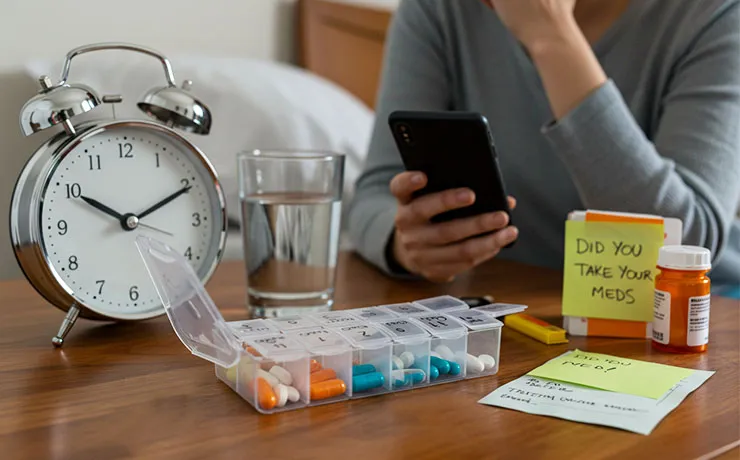What Happens If You Miss a Dose of Your Medication?

Managing medications effectively is crucial for your health and well-being, but it’s easy to occasionally forget to take a dose. Whether it’s a busy day or simply an oversight, missing a dose can happen to anyone. However, missing a dose can have consequences, depending on the type of medication and how long you’ve been taking it.
At Farmington Drugs, we understand that life can get hectic. This blog post will explain what happens if you miss a dose of your medication and provide helpful tips for how to handle this situation safely.
Why Is It Important to Take Your Medication on Time?
Taking your medication as prescribed is vital to ensuring that it works effectively. Medications are designed to be taken at specific times and dosages to maintain a steady level of the drug in your body. For many conditions, such as chronic illnesses like diabetes or hypertension, consistency in taking your medication is key to controlling symptoms and preventing complications.
Skipping doses or taking them irregularly can disrupt this balance, leading to ineffective treatment or worsening of your condition.
What Happens If You Miss a Dose?
The impact of missing a dose depends on the type of medication, how long it has been since your last dose, and the specific condition you are treating. Let’s look at the potential consequences of missing a dose for different types of medications:
1. Chronic Condition Medications (e.g., diabetes, high blood pressure)
For medications that help manage chronic conditions, missing a dose can cause your symptoms to worsen or lead to complications. For example, if you miss a dose of your blood pressure medication, your blood pressure may increase, increasing your risk of heart attack or stroke. Similarly, missing doses of diabetes medications can lead to unstable blood sugar levels, potentially causing hyperglycemia or hypoglycemia.
What to Do:
-
If you realize you’ve missed a dose, take it as soon as possible unless it’s nearly time for your next dose.
-
Never take two doses at once to make up for a missed dose.
-
If you’re unsure about what to do, consult your pharmacist for advice.
2. Antibiotics
For antibiotics, taking the medication on time is crucial to completely clearing the infection from your body. Missing a dose or stopping the medication too early can lead to antibiotic resistance, where bacteria become resistant to the drug, making it harder to treat infections in the future.
What to Do:
-
If you miss a dose, take it as soon as you remember, but skip it if it’s close to your next scheduled dose.
-
Do not double up to make up for the missed dose.
-
Always complete the full course of antibiotics, even if you start feeling better before finishing the medication.
3. Pain Medications
Pain medications, especially those that are stronger, like opioids or prescription NSAIDs, are usually taken on a regular schedule to manage pain effectively. Missing a dose may cause your pain to return or worsen.
What to Do:
-
Take the missed dose as soon as you remember, unless it’s close to your next dose.
-
Don’t take more than prescribed to make up for the missed dose.
-
If you’re experiencing pain, contact your doctor or pharmacist to discuss whether you need a different treatment plan or dosage.
4. Mood and Mental Health Medications (e.g., antidepressants, anti-anxiety medications)
Mental health medications, including antidepressants, anti-anxiety medications, and mood stabilizers, require consistent use to maintain balance in your brain’s chemistry. Missing doses may result in a return of symptoms like anxiety, depression, or irritability. In some cases, abrupt changes in the level of these medications in your system can cause withdrawal symptoms.
What to Do:
-
If you miss a dose, take it as soon as you remember, unless it’s almost time for your next dose.
-
Do not double the dose to make up for the missed one.
-
Speak with your doctor or pharmacist if you have missed several doses or are concerned about withdrawal symptoms.
5. Hormonal Medications (e.g., birth control, thyroid medications)
Hormonal medications are often sensitive to timing. Missing a dose of birth control can increase the risk of pregnancy, while missing thyroid medications can disrupt your body’s metabolism and cause symptoms like fatigue and weight gain.
What to Do:
-
For birth control, follow the instructions on your package or consult your pharmacist. Some pills may be taken within 12 hours of the missed dose, but others may require you to use an alternative form of contraception.
-
For thyroid medications, taking the missed dose as soon as possible is important, but never take two doses at once.
-
If you are unsure, contact your healthcare provider to ensure you are following the correct protocol.
General Tips for Preventing Missed Doses
Missing doses occasionally is a common issue, but there are several strategies you can use to help reduce the likelihood of this happening:
1. Set a Routine
Taking your medication at the same time every day helps establish a routine, making it less likely for you to forget. You can align your medication schedule with other daily tasks, like brushing your teeth, eating meals, or going to bed.
2. Use Medication Reminders
Use tools like phone alarms, reminder apps, or a daily pill organizer to remind you when it’s time to take your medications. Some pharmacies also offer automated reminder services that can send you texts or calls when it’s time to refill or take your medication.
3. Ask for Help
If you’re taking several medications or have trouble remembering your doses, ask a family member or caregiver to help remind you. Alternatively, pharmacies can offer medication synchronization services to align your refills so you can pick them up at the same time each month.
4. Track Your Medication
Keep a medication journal or use an app to track when you take your medication. This is especially useful for complex regimens, ensuring that you’re following your prescribed schedule.
What to Do if You Miss Multiple Doses
If you’ve missed multiple doses or are unsure of what to do next, don’t hesitate to contact your pharmacist or healthcare provider. They can offer specific advice based on your medication and condition. Don’t attempt to adjust your dose without professional guidance.
How Farmington Drugs Can Help
At Farmington Drugs, we are here to support you in managing your medication regimen safely and effectively. Our team can provide personalized counseling, offer medication synchronization services, and help you set up reminders for your medications.
If you ever have questions or need advice on what to do if you miss a dose, don’t hesitate to reach out. Our pharmacists are available to help you navigate your treatment plan and ensure that you’re getting the most from your medications.
Final Thoughts
Missing a dose of your medication doesn’t necessarily mean a disaster, but it’s important to handle it the right way. By understanding the risks associated with missed doses, following best practices, and seeking guidance when needed, you can ensure that your medications are working effectively to improve your health. If you have any questions or concerns, Farmington Drugs is here to help you stay on track with your treatment.





